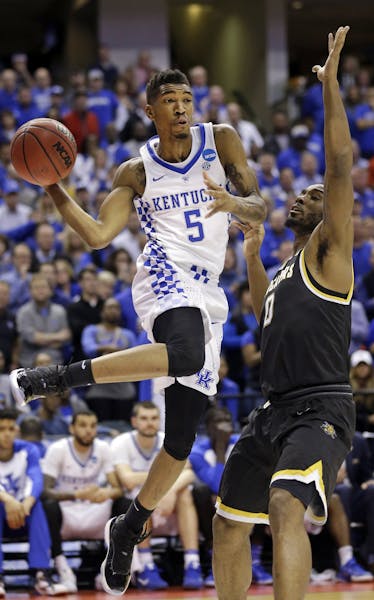This time last year, the Timberwolves' new brass prioritized one pressing need over another and drafted Providence point guard Kris Dunn's defense rather than Kentucky guard Jamal Murray's shooting.
More than a few card-carrying members of Wolves Nation second-guess that decision as time passes. They are not alone.
"Thibs and I are good friends and I get on him about that," Kentucky coach John Calipari said. "Jamal is quite a player."
A year later, Wolves coach/President of Basketball Operations Tom Thibodeau and General Manager Scott Layden must decide whether another shooter — freshman guard Malik Monk — is the next in a growing line of Kentucky players who show more as professionals than NBA scouts ever saw from them in Lexington.
Denver's Murray, Phoenix's Devin Booker and Eric Bledsoe as well as the Wolves' Karl-Anthony Towns, to name four, all have done so. They blossomed in the NBA after Calipari asked them to play their roles and concentrate most on what NBA scouts wanted to see during their brief time with a program that year after year is a collegiate version of Golden State's professional super-team.
"I can tell you firsthand how that goes," said Towns, whose shooting and perimeter skills were obscured at Kentucky.
In December, Monk scored 47 points — including the winning three-pointer — in a 103-100 Wildcats victory over eventual national champion North Carolina. Until Philadelphia swapped the draft's third pick for Boston's first, Monk was projected to be selected anywhere from third to eighth in Thursday's draft.
The Wolves will pick seventh. Thibodeau promises his team will take the best player, not the one who best fits Towns, Andrew Wiggins and Zach LaVine for a team that still needs shooting, defense, toughness and experience.
If NBA scouts have underestimated Kentucky players' futures as pros, well, you'd think they wouldn't anymore, not after the school produced the aforementioned players as well as John Wall, DeMarcus Cousins and Anthony Davis these past seven years.
"You would think, if they're all following this thing and how we do it," Calipari said. "Our guys, they come here and they share. They become great teammates. They've been challenged by each other every day in practice, which is why they go on to the league and perform. They also understand they have to give up a little bit of their game here, but you can still see it."
Heating up
Now the Wolves and other lottery teams must decide whether Monk is an undersized shooting guard with short arms who is best suited to come off the bench as a scorer.
"I wish he was 6-5 and not 6-3," said ESPN draft analyst Fran Fraschilla, who suggests Monk's career could parallel that of the Los Angeles Clippers' Jamal Crawford. "He is going to have to become what I call a technician. He is really going to have work on NBA footwork, creating space and separation."
Or might he be the draft's best shooter with deep range and best natural scorer, possibly another CJ McCollum, Portland's young, often unstoppable star — or better?
Asked for a scouting report on his Wildcats teammate, projected top-five pick De'Aaron Fox offered: "First, don't let him get hot. If he gets hot, it's over."
Fox compares Monk to undersized Celtics shooting guard Avery Bradley and said Monk is unlike so many other prospects who don't shoot the NBA three well enough.
"That's true for just about every player who comes into the draft, except for Malik," Fox said. "Malik shoots it from half-court well."
You could say Monk had range and got hot in that 47-point December contest, when Calipari implored Monk late in the game to drive to the basket so he could draw a foul.
Monk nonetheless chucked a winning three instead.
"It was like a pickup game," Monk said after that game. "Coach wanted me to drive, but I was hot."
Worth price of admission?
In a rematch with North Carolina in an NCAA tournament regional final three months later, Monk made a late tying three, but the Tar Heels held him to 12 points and won with a buzzer-beater that sent them to the Final Four.
"When he scored 47, he was just in a groove," UNC guard Isaiah Hicks said. "We tried length, we tried getting up on him, everything. It was just one of those things. You thought you played great D, but he just jumped over you. Trust me: I was on him. Everybody was on him at one time.
"The next time, our objective was not to let him get started. Once a shooter starts making shots, he makes tough shots."
Calipari praises Monk's intellect, saying he never had to illustrate a play on a white board because just telling Monk what to do was enough. He also predicts Monk will be more than a one-dimensional scorer in the NBA.
"I believe he'll become a terrific rebounder and defender for his position because there's no reason he shouldn't be," Calipari said. "He's long enough. He's athletic enough. He's bouncy enough."
If the Wolves do choose the best player seventh, will Monk be the one? It's a draft where they will also consider Florida State's Jonathan Issac, Arizona's Lauri Markkanen — or any player (Fox? Duke's Jayson Tatum?) who might unexpectedly drop to them.
"Malik is an elite, special athlete and talent," Calipari said. "When he gets in a zone, when he just locks it down, you just kind of sit there and say, 'Oh my goodness.' Like the North Carolina game: He had 47 and I'm telling him to drive the ball and he shoots a three and it goes down, straight down, doesn't hit net or anything … I think he would be one of those guys that fans pay to go see and say, 'I got to see what he's going to do today.' "

